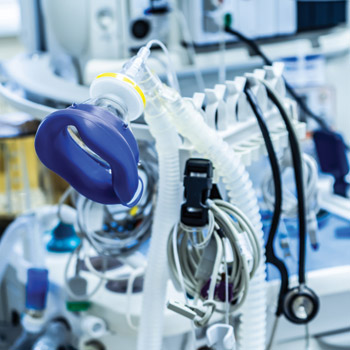Internists must navigate multiple worlds during the pandemic
Addressing the COVID-19 pandemic has cast a bright light on the value of the internist's comprehensive case management skills, among them symptom identification, accurate diagnosis, and disease management.
“What is an internist?” asked the groggy man lying supine on the floor at the back of the airplane (back when we frequently traveled in planes). There had been an overhead call for medical assistance, and I found him diaphoretic but coming around and introduced myself with my name and as an internist.
After I clarified that he had no allergies, took no medicines, and had no medical problems (amazing in itself), then took vital signs and a brief history of events, it was clear this was highly likely to have been simply a vasovagal episode. However, I did not want him trying to stand up right away, so to encourage him to stay lying down, I answered his question with my brief elevator speech from ACP: Internists are “physicians who apply scientific knowledge and clinical expertise to diagnosis, treatment, and compassionate care across the spectrum from health to complex illness.”
The ER doc who had subsequently come up to help was biting her lip not to comment, but the man seemed reassured.
Internists skillfully navigate many different worlds, including those of specialty, geography, academics, military service, research, volunteerism, administration, informatics, and others. We have a sampling of this in our medical school and residency, and some in fellowship years. Then in our career we may practice in the clinic, in the hospital, or both. We find over time we travel through multiple worlds, some of which intersect.
Addressing the COVID-19 pandemic has cast a bright light on the value of the internist. There is the need for symptom identification, accurate diagnosis, and disease management for outpatients and hospitalized patients. There is the need for promoting safety and reducing risk of viral spread among patients, their friends, families, and coworkers, and among caregivers. There is the need for epidemiologic studies, public health recommendations based on the most solid evidence available at the time, and treatment and vaccine research. There is the need for comprehensive case management, realizing how many patients may not have adequate housing to shelter and self-isolate, may not have access to care, and may not be able to afford the anticoagulants and other medications advised.
None of us trained for COVID-19, yet at the same time we were all trained for this challenge. Medical knowledge, social systems, and diseases are not static through history. One of the key identifying features of an internist (which I did not expound on to the man in the plane) is how we are taught to think. Acquiring a fund of background knowledge is key, including biochemistry, anatomy, mathematics, statistics, physics, pathophysiology, communication skills, history, and ethics. This is necessary, but not sufficient.
We are also trained to “learn how to learn, and learn how to think,” and the admonishment for internists to be lifelong learners is critically important for survival through the pandemic: survival of our patients, our social connections, our practices, and ourselves. Critical thinking, and approaches to reducing medical error in diagnosis and treatment, is a core value of our cognitive specialty. Even when extremely useful algorithms and templates are used for management, before implementation the internist always pauses to think, “What else could this be? Do the pieces fit together for this diagnosis? Is one aspect of the case affecting my approach to other aspects of the case? Does this make sense, or do I need to act now but keep an open mind going forward if the course of the patient's illness is not as expected?”
In addition to medical treatments, empathy, mutual respect, and communication with patients, families, and colleagues are important in so many aspects of this devastating disease, which has isolated so many people at their time of greatest need. Internists have been ingenious in finding ways to help both caregivers and those being treated connect.
COVID-19 ruthlessly blazes through multiple worlds. It does not respect the difference between a patient in the ICU and a patient at home, or between family and strangers. In 2020, internists have learned new information with lightning speed, and have practiced medicine in places unfamiliar to them, be it a hospital, a clinic, a telemedicine setting, or a tent outside. Our skill sets have expanded to be able to do what needs to be done. It is our past training but also our intellectual drive to continue learning that have allowed us to serve in so many roles. It is the support of our professional home of ACP, with its wealth of online information, its advocacy for the fair and effective implementation of medical resources, and its overview of the sustainability of medical practices. It is the connections with our colleagues, knowing we can count on each other to get through this hard time.
Geoffrey Chaucer wrote in 1382, “The lyf so short, the craft so long to lerne.” He was quoting Hippocrates (c. 460-375 BCE): “Life is short, and Art long: the crisis fleeting; experience perilous, and decision difficult. The physician must not only be prepared to do what is right himself, but also to make the patient, the attendants, and externals cooperate.”
Clearly, today “himself” is too limiting to one gender. “Making” the patient cooperate is authoritarian and not effective, as we find outcomes are better with shared decision making and understanding the patient's values, resources, and challenges. “Making” the attendants cooperate is also not productive, as care is better with a mutually respectful clinical team. Externals can be a challenge. But the essence of this quote that resonates today, more than 2,000 years later, is that physicians have a tremendous amount to learn over a relatively short time in order to practice excellent medicine in a dangerous and uncertain environment. We need to follow an ethical compass to do what is right. And we need to work with the patient, our teams, our professional societies, and our larger culture to be able to do the right thing even in the midst of radically changing events.
I wish you safety, and success in your ever-evolving practice of medicine. Know that your professional home of ACP continues to grow to support you as you skillfully navigate the many worlds of the internist. It is handy to always have an elevator speech ready to be able to explain what an internist is, but your dedicated daily work speaks louder than words.





